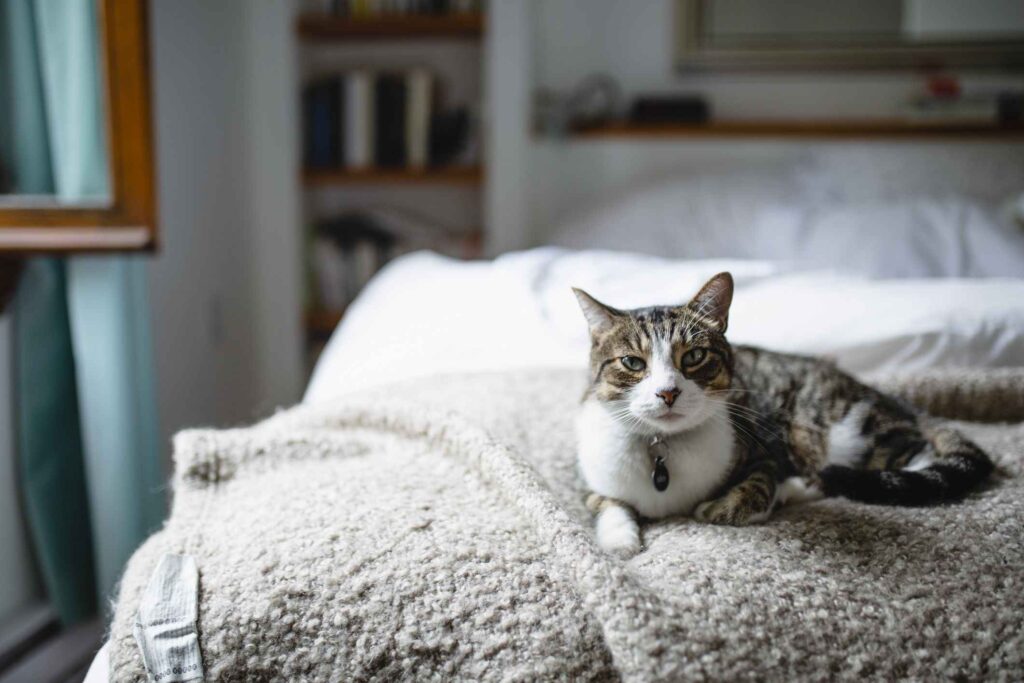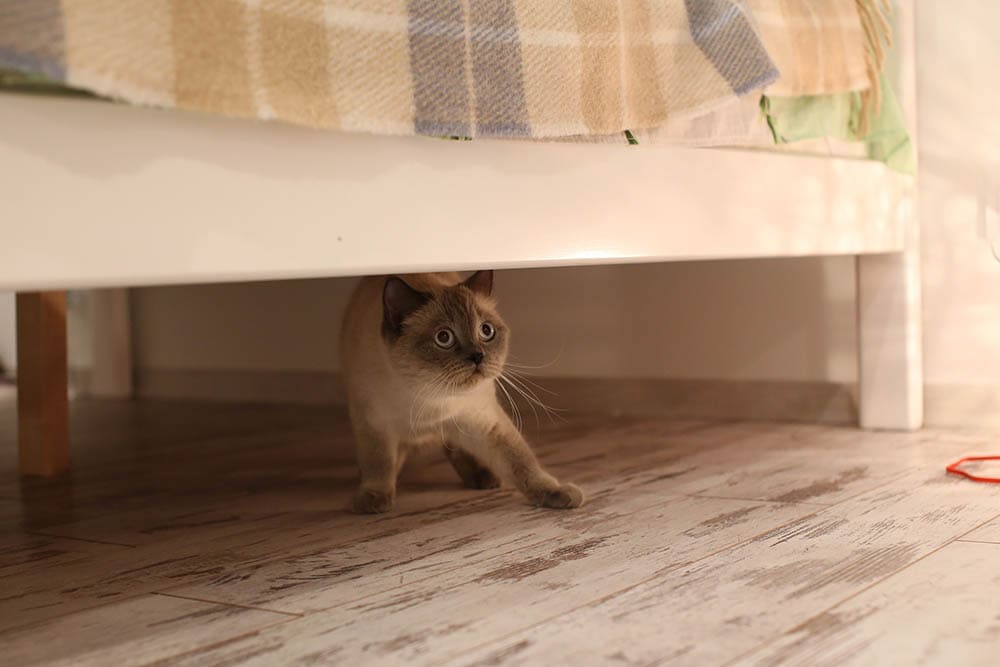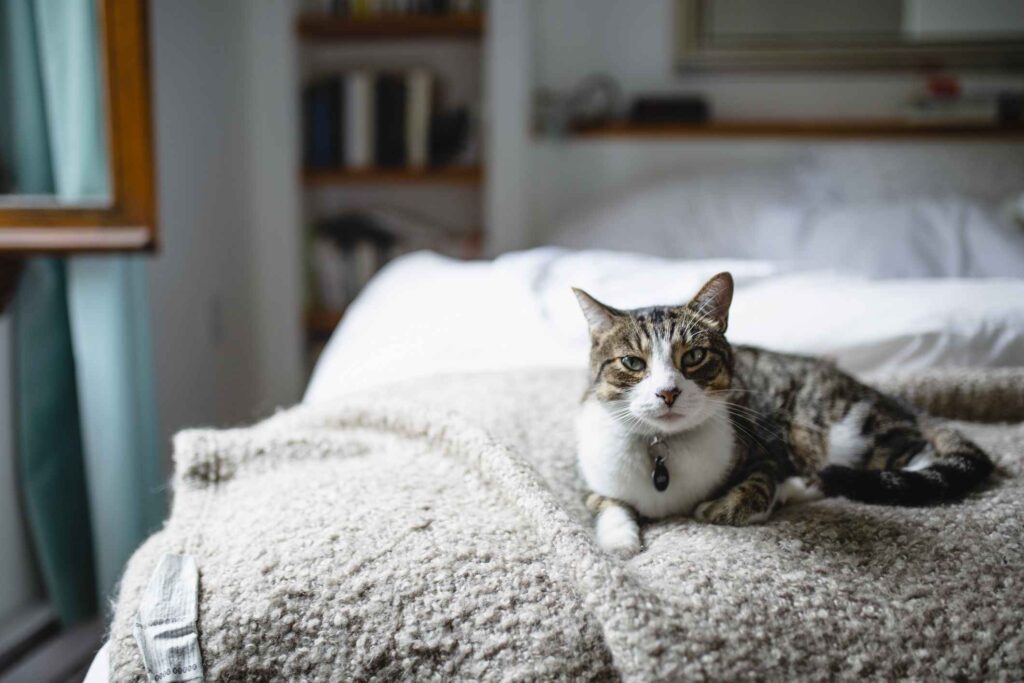5 Reasons Why Your Cat is Scared of the Bed

Do you often find your cat sleeping anywhere but on the bed? Do they run away every time you try to get them to snuggle with you at night? Whether it’s the cat’s own bed or yours, it can be frustrating and confusing for you as a cat parent trying to find out why your cat is scared of the bed.
In this article, we’ll explore the reasons why your cat may be avoiding the bed and offer some solutions to help them overcome their fear.
Why Your Cat is Scared of the Bed?

Understanding why your cat might be scared of the bed is important in helping it overcome this problem. There might be many reasons why your cat is displaying this behavior. However, we will discuss 5 most common reasons and possible solutions for them to help your cat start sleeping on the bed in no time.
Reason 1: Negative Association
Cats have long memories, and they can associate certain experiences with particular places or objects. If your cat had a negative experience on your bed, they might avoid it altogether. For instance, if your cat associates the bed with getting medicine or being reprimanded, they will likely avoid it. A cat can form this association from a variety of experiences, including a loud noise or an unfamiliar person on the bed.
Determine what recent changes have caused your cat to form a negative association with the bed. Doing so, can help you single out the factor which caused your cat to be scared of the bed. Maybe it’s the new sheets, new pillows or the new detergent you may used?
Solution: Change the Association
If your cat has a negative association with the bed, you can help them overcome their fear by changing their association with the bed. You can do this by providing positive experiences on the bed, such as playtime or treats. Try to make the bed a fun and comfortable place for your cat, and they will start to associate it with positive experiences.
You can start to bring her toys near to the bed and play with her close to it. Don’t do it all at once, though as it may make your cat run away from the bed. Everyday, make her come a little bit closer to the bed. With patience and love, your cat will start to see the bed as what it is, again.
Reason 2: Fear of Heights
Sometimes cats may be afraid of heights, even though they are natural climbers and love to be up high. If your bed is too high off the ground, or if your cat has had a bad experience falling from a high place, that may be why your cat is scared of the bed. It’s important to understand that cats are sensitive creatures, and their experiences shape their behavior.
Additionally, some cats may be afraid of sleeping on the bed because they have had a bad experience. You might have accidentally knocked them off the bed in your sleep in the middle of the night. This can be a contributing factor to the cat’s fear of the bed. Your cat may have associated the bed with getting hurt, even if you were not aware of it.
Solution: Provide Alternatives
If your cat is afraid of heights or the bed, there are ways you can help them feel comfortable and safe. Providing alternatives to sleeping on the bed can help. You can offer a comfortable and cozy cat bed on the ground or a low window perch for your cat to use instead. This will give your cat a comfortable place to rest without having to worry about the height.
It’s important to remember that cats are creatures of habit and routine, so it may take some time for them to adjust to their new sleeping arrangements. Be patient and understanding with your cat, and provide them with positive reinforcement when they use their new sleeping spot. With time and patience, your cat will learn to feel comfortable and secure in their new sleeping space.
Reason 3: Fear of Crowded Spaces
Cats like to have their own space. They may become anxious or scared if they feel like someone is crowding or trapping them. This can be particularly true when it comes to sleeping spaces. If your bed is cluttered with a lot of pillows, blankets, or other items, your cat may see it as too crowded and choose to avoid it altogether. Additionally, if your cat is sharing the bed with other animals, they may not feel like they have their own space, which can also cause fear or anxiety.
It’s important to remember that cats are territorial creatures, and they need to have their own space to feel safe and secure. A clutter-free and spacious bed will provide a comfortable and relaxing sleeping environment for your feline friend. By doing so, you can help your cat overcome their fear of crowded spaces and feel more at ease on the bed.
Solution: Clear the Clutter and Give Space
If you want your cat to feel comfortable on your bed, you need to make sure it’s a welcoming and inviting space. Start by clearing the clutter and removing any excess pillows or blankets that may be taking up too much space. This will give your cat more room to move around and stretch out comfortably.
Additionally, consider providing separate sleeping areas for each animal if you have multiple pets. This will ensure that your cat has their own space and isn’t feeling crowded or uncomfortable. You can also provide a cozy cat bed on the ground or a low window perch as an alternative to the bed if your cat is still reluctant to use the bed.
Remember, cats are unique creatures with their own personalities and preferences. It’s important to understand your cat’s needs and provide them with a comfortable and secure living environment. By taking the time to address their fears and anxieties, you can help your cat feel more relaxed and at ease in your home. With a little patience and love, you and your cat can enjoy a peaceful night’s sleep on the bed.
Reason 4: Dirty Bedsheets
Dirty bedsheets can be a major reason why your cat is scared of the bed. Cats have a very strong sense of smell, and if your bed is not clean, it can be quite off-putting for them. When cats sense strong and unfamiliar scents on their beds, they may avoid them altogether. This is especially true for cats that have sensitive noses or are prone to allergies.
Cats also have a strong instinct to keep their sleeping areas clean. They naturally groom themselves and try to keep their surroundings clean as well. If your bed sheets are dirty or have been soiled, your cat may be reluctant to sleep there. This can be a problem not only for your cat’s comfort but also for their health.
Additionally, dirty bedsheets can harbor bacteria, dust mites, and other allergens that can cause respiratory problems for cats. Cats with asthma or other respiratory issues may be particularly sensitive to these allergens. Therefore, if your cat has a habit of licking or chewing on the bedsheets, they may ingest harmful bacteria or chemicals that can lead to gastrointestinal problems.
Solution: Keep Your Bedsheets Clean
To encourage your cat to sleep on your bed, it’s essential to keep your bedsheets clean. This means washing them regularly, preferably at least once a week, and using a pet-safe detergent. You can also use a fabric spray to help neutralize any odors that may linger on the sheets.
In addition to washing your sheets, you should also vacuum your mattress regularly to remove any dust or dirt that may have accumulated. This will not only help keep your cat’s sleeping environment clean but also improve your own health by reducing the number of allergens in your bed.
If your cat has already developed an aversion to your bed due to dirty sheets, it may take some time and patience to encourage them to use it again. Try washing your sheets and then placing a soft and comfortable blanket or towel on the bed that your cat likes to sleep on. This will provide a familiar and comfortable scent that your cat can associate with the bed.
Reason 5: Medical Issues
As much as we want our pet cat to be healthy and happy, sometimes they can experience medical issues that cause them to avoid certain activities or places. If your cat is avoiding the bed, it’s possible that they may have an underlying medical issue that’s causing them pain or discomfort.
Cats with arthritis, for example, may find it difficult to climb onto the bed, which can cause them to avoid it altogether. Arthritis is a common condition in cats, especially as they age, and it can cause pain and stiffness in their joints. This can make it difficult for them to jump or climb, which can make getting onto the bed a daunting task.
Similarly, cats with urinary tract infections may avoid the bed because it’s too painful to jump up and down. Urinary tract infections can cause pain and discomfort, especially when urinating, which can make it difficult for cats to move around freely. Jumping up and down from the bed can exacerbate this discomfort, making the bed a less-than-ideal spot for your cat.
Solution: Consult with Your Vet
If you suspect that your cat’s fear of the bed is due to a medical issue, it’s important to consult with your vet. Your vet can perform a physical exam and diagnostic tests to determine if there are any underlying medical issues that may be causing your cat’s discomfort.
Once your vet has diagnosed the issue, they can provide treatment to help your cat feel more comfortable and confident. For example, if your cat has arthritis, your vet may prescribe pain medication or joint supplements to help manage their pain and improve their mobility. If your cat has a urinary tract infection, your vet may prescribe antibiotics or other medications to help clear up the infection and alleviate your cat’s discomfort.
In addition to medical treatment, there are other steps you can take to make your cat more comfortable on the bed. You can provide a stool or ramp to help your cat climb onto the bed more easily if they have mobility issues. You can also provide a litter box or other comfortable spot nearby so that your cat doesn’t have to jump up and down from the bed to use the restroom.
Conclusion

In conclusion, there are several reasons why your cat may avoid sleeping on your bed. From negative associations to medical issues, understanding the root cause is crucial in finding a solution. By implementing the solutions outlined in this blog post, you can help your cat feel more comfortable and confident on the bed, while also strengthening your bond with your pet cat. Remember, patience, love, and understanding are key to creating a happy and comfortable environment for your cat to rest and sleep peacefully.


